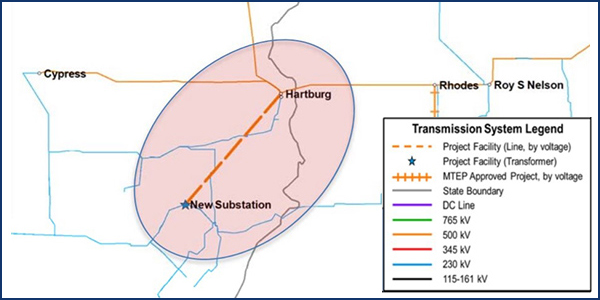By Tom Kleckner
A U.S. district court last week dismissed with prejudice a lawsuit seeking to overturn a Texas law giving the state’s incumbent utilities the right of first refusal over transmission projects (1:19-cv-00626).
The District Court for the Western District of Texas on Wednesday effectively ended an attempt by a number of NextEra Energy subsidiaries to repeal the legislation (Senate Bill 1938), which they said discriminated against out-of-state transmission developers.
The court also denied intervention requests by nearly a dozen parties.
Passed last May, the law grants certificates of convenience and necessity to build, own or operate new transmission facilities that interconnect with existing facilities “only to the owner of that existing facility.” (See Texas ROFR Bill Passes, Awaits Governor’s Signature.)
District Judge Lee Yeakel said the plaintiffs, NextEra Energy Capital Holdings (NEECH) and four other NextEra transmission owner/developer entities, failed to demonstrate that the law discriminates against out-of-state transmission providers or has a discriminatory purpose or effect.
NEECH, NextEra Energy Transmission (NEET), NextEra Energy Transmission Midwest and Lone Star Transmission alleged that SB 1938 discriminates against interstate commerce by giving electric utilities that already operate in Texas the sole right to build transmission lines with an end point in the state. They based their reasoning on the Constitution’s Commerce and Contracts clauses. (See NextEra Takes Texas to Court over ROFR Law.)
The court found SB 1938 was not “analogous” to the cases the NextEra companies cited, “all of which involve the flow of goods in interstate commerce or burdensome requirements as a precondition for allowing the flow of goods in interstate commerce.”
“SB 1938 does not purport to regulate the transmission of electricity in interstate commerce,” Yeakel wrote. “It regulates only the construction and operation of transmission lines and facilities within Texas, which distinguishes it from the cases upon which plaintiffs rely.”
Yeakel said the law does not single out Texas transmission providers “as the sole beneficiaries of the right of first refusal over out-of-state providers” and does not “overtly discriminate” by granting incumbent transmission providers the ROFR “because that preference does not discriminate against out-of-state providers.”
“Indeed, most incumbent providers in Texas are owned by out-of-state companies, and SB 1938 allows out-of-state providers a means to enter the Texas market for transmission services by buying a Texas utility,” Yeakel said.
The plaintiffs had claimed standing because the law jeopardizes its Hartburg-Sabine Junction competitive project in southeast Texas. NEET Midwest in 2018 won a competitive bid from MISO for the project, which would consist of a new 500-kV line, four 230-kV lines and a 500-kV substation.
MISO executives have acknowledged that the congestion-relieving project “may face challenges” as a result of the law, casting its future into doubt. (See Uncertainty Deepens for Hartburg-Sabine Project.)
Katie Coleman, counsel for the Texas Association of Manufacturers, said the industrial lobbying group agrees with the decision.
“Industrial companies in Texas see theoretical benefits to a bidding process for transmission but have yet to see a workable model,” she said. “If and when the state wants to move in that direction, it needs to be done deliberately and with appropriate customer protections. Until then, having the current endpoint owners build new lines makes the most sense for customers and the state.”
NextEra did not respond to a request for comment.





